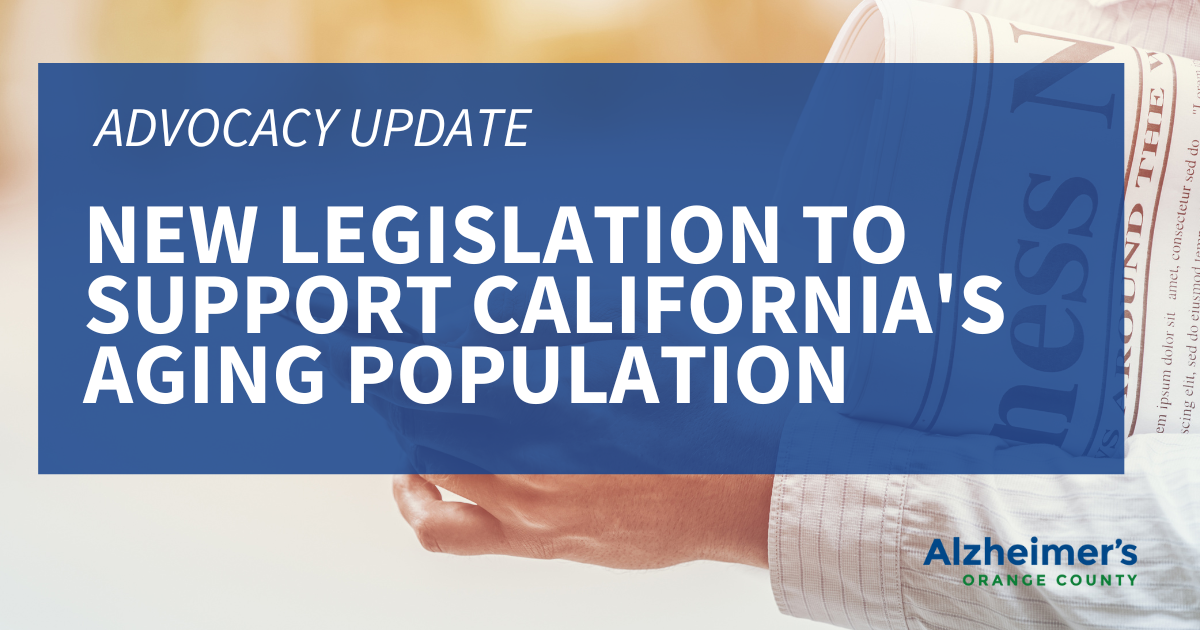On World Alzheimer’s Day, September 21, 2024, California took a significant step forward in its fight against dementia and its efforts to help older adults thrive. Governor Gavin Newsom signed a package of bills aimed at providing greater safety, care, and accountability for aging services, reinforcing the state’s commitment to healthy aging as part of its Master Plan for Aging (MPA).
These policies will play a critical role in reforming California’s services for older adults ahead of 2030, when one in four Californians will be aged 60 or older. As more people live longer, the demand for aging services is increasing, and this legislative action ensures that California remains at the forefront of innovation in aging care.
Key Legislation Signed by Governor Newsom:
- AB 2541 by Assemblymember Jasmeet Bains (D-Delano): This law mandates that law enforcement officers receive specialized training on preventing and responding to wandering incidents involving individuals with Alzheimer’s, autism, and dementia. Given that over 60% of individuals with Alzheimer’s will wander at some point, this training is crucial to ensuring their safety. As Assemblymember Bains, Chair of the Assembly Aging and Long-Term Care Committee, noted:
“Finding people quickly is key because we know the survival rate drops dramatically the longer it takes to find the missing person.”
- SB 639 by Senator Monique Limón (D-Santa Barbara): Healthcare professionals who treat older adults, such as doctors and nurses, must now undertake continuing education in geriatrics and dementia care. Senator Limón’s bill addresses a growing need for dementia care in the healthcare system, ensuring that professionals are equipped to manage the unique challenges of Alzheimer’s and related disorders.
“The fight to end Alzheimer’s is incredibly personal for me,” said Senator Limón, reflecting on her own grandmother’s battle with the disease. “With more support, education, and coordinated efforts in healthcare, we can provide comprehensive care to Californians impacted by Alzheimer’s and dementia.”
- SB 1249 by Senator Richard Roth (D-Riverside): This law modernizes the Mello-Granlund Older Californians Act of 1996, increasing local control over aging services and establishing new performance measures to enhance accountability. Senator Roth’s bill ensures that local aging services are integrated with other social services, allowing for better care delivery to California’s rapidly aging population.
“We must ensure that we continue to address the diverse needs of a rapidly aging population,” Senator Roth stated. “Governor Newsom’s signing of SB 1249 ensures the Older Californians Act is modernized, helping us create a more accountable and integrated system of care.”
Building on California’s Master Plan for Aging
These bills further advance California’s Master Plan for Aging, a comprehensive blueprint released in 2021 that outlines a vision for an age-friendly state. The plan emphasizes the need for collaboration across state government, local communities, private organizations, and philanthropy to create environments that support aging Californians.
Susan DeMarois, Director of the California Department of Aging, emphasized that the reimagining of the state’s aging services has been underway for some time:
“Older adults make up a greater segment of our population and are likely to live longer, healthier lives. Senator Roth’s bill helps ensure that all older adults and their families can access consistent, high-quality services no matter where they live in California.”
As California’s population over the age of 65 is projected to surpass the under-18 population by 2030, these new laws are part of a larger effort to prepare the state for the significant demographic shift. Governor Newsom’s leadership has been instrumental in shaping policies that address the unique challenges of aging, including the growing incidence of neurocognitive disorders such as Alzheimer’s disease.
“Take On Alzheimer’s” Campaign
In tandem with the new legislative measures, California has also launched a new public education and awareness campaign, “Take On Alzheimer’s,” aimed at supporting the prevention, diagnosis, and care of Alzheimer’s and related dementias. This campaign will help increase public understanding of Alzheimer’s disease and encourage early intervention and diagnosis, which are critical to improving outcomes for individuals and their families.
Looking Forward & Local Support
At Alzheimer’s Orange County, we are deeply grateful for these new policies, which align with our mission of providing quality care and services to those affected by Alzheimer’s and other memory disorders. We look forward to continuing our work with local partners and policymakers to ensure that every Californian affected by Alzheimer’s receives the care and support they deserve.
Together, we can build a better, more age-friendly and dementia friendly Orange County and California.


